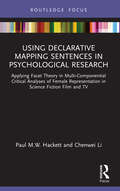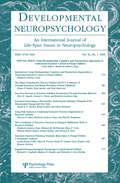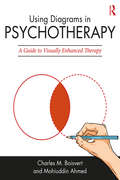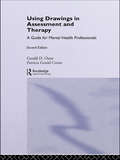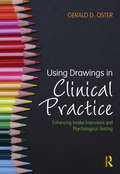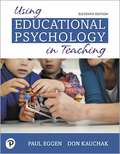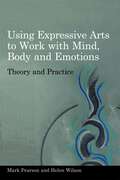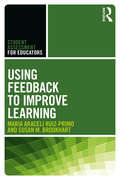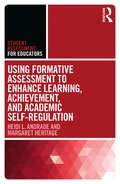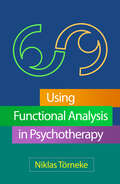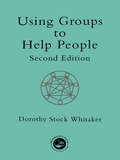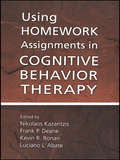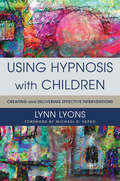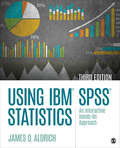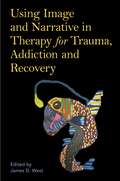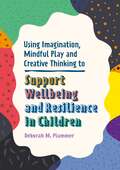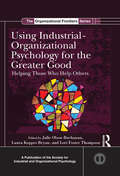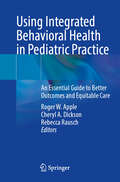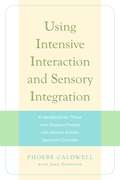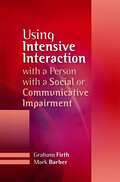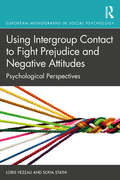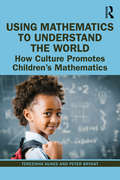- Table View
- List View
Using Declarative Mapping Sentences in Psychological Research: Applying Facet Theory in Multi-Componential Critical Analyses of Female Representation in Science Fiction Film and TV (Routledge Research in Psychology)
by Paul M.W. Hackett Chenwei LiUsing facet theory and Hackett’s pioneering development of the declarative mapping sentence (DMS) as a qualitative methodology, this volume explains the process of formulating and applying the DMS to critically assess female representation in science fiction. Using a comparative approach to the development of female roles in Western science fiction films and television, the authors illustrate how the DMS is formulated and used to analyse the psychological and behavioral profiles of female characters. By maintaining the common structure of the DMS across films while adapting its content for each female role, the text demonstrates the flexibility of the DMS in providing a structure for varied research domains, enabling results to be uniformly compared, contrasted and classified. This insightful and thought-provoking volume will appeal to researchers, academics and educators interested in psychological methods and statistics, qualitative research in gender identity, and research methods more generally. Those especially interested in behavioural psychology, gender and cinema, and science fiction will also benefit from this volume.
Using Developmental, Cognitive, and Neuroscience Approaches To Understand Executive Control in Young Children: A Special Issue of developmental Neuropsychology
by Kimberly Andrews EspyThe seven articles in this special issue represent a sampling of the exciting findings that are beginning to emerge from studies of executive control in young children. They demonstrate the multidisciplinary approaches to study cognition in young children that include application of cognitive, neuroscience, and developmental paradigms in typically developing youngsters, as well as those affected by clinical conditions, such as traumatic brain injury, exposure to low levels of lead in the environment, and prematurity. Although much work remains to be done, these study results are illustrative of the dynamic work in this exciting development period.
Using Diagrams in Psychotherapy: A Guide to Visually Enhanced Therapy
by Mohiuddin Ahmed Charles M. BoisvertUsing Diagrams in Psychotherapy presents the Visually Enhanced Therapy framework, a unique approach to communicating information in psychotherapy. The framework brings visual information processing principles and techniques into the practice of psychotherapy to help therapists communicate more effectively with clients. Replete with illustrations and therapist thought boxes designed to help readers translate theory to practice, the book presents visual strategies that enable clients to become more actively engaged in therapy sessions and to better retain information. This is a thorough, user-friendly resource with numerous diagrams and worksheets for implementing visually oriented interventions across a broad range of clients, clinical settings, and clinical problems.
Using Drawings in Assessment and Therapy: A Guide for Mental Health Professionals
by Gerald D. Oster Patricia Gould CroneThis highly practical book provides useful drawing directives to clinicians involved in the assessment and treatment of individuals, families, and groups in both inpatient and outpatient settings. The authors present many case histories to show how the various aspects of drawing techniques can be integrated and applied in clinical practice. "Using Drawings in Assessment and Therapy" is vividly illustrated with over 90 drawings, which are used to describe how the therapeutic interaction can be enhanced by adding this method to the clinician's repertoire. This second edition condenses and synthesizes a variety of drawing directives that aid clinicians in the assessment process and in therapy. It also features updated literature reviews, with new case studies and accompanying art work. All therapists who are involved or interested in art therapy will gain a wealth of information, insight, and practical tips from this thorough volume.
Using Drawings in Clinical Practice: Enhancing Intake Interviews and Psychological Testing
by Gerald D. OsterClinicians are always in need of enticing techniques to engage clients on a daily basis, especially those who are nonverbal or initially opposed to feedback. Using Drawings in Clinical Practice provides a rich variety of drawing directives to enhance the diagnostic process. In this highly illustrated text, clinicians will discover the tools they need to interact effectively with their clients. The book places special emphasis on intake interviewing and psychological testing, where the potential for uncovering hidden conflicts and therapeutic direction is especially poignant. Case studies provide a comprehensive overview of how to introduce simple drawings and gain remarkable insights. Using Drawings in Clinical Practice is a crucial guidebook for professionals who seek new ways to facilitate meaningful communication and interactions in their practice settings.
Using Educational Psychology in Teaching
by Don Kauchak Paul EggenAs in all fields, educational psychology rapidly advances, and the goal of this edition is to capitalize on these advances to produce a book that meets three goals: to provide the most conceptually sound theory possible, to include up-to-date research, and to prepare a text that provides the most concrete and specific suggestions in the field for applying the content of Educational Psychology in PreK-12 classrooms. Many students can describe and explain the topics included in an educational psychology text, but far fewer know how, as teachers, to apply these topics to increase their students' learning. Working directly with teachers and students in PreK-12 classrooms, the authors have provided the most realistically applied textbook in educational psychology.
Using Expressive Arts to Work with Mind, Body and Emotions
by Mark Pearson Helen WilsonUsing Expressive Arts to Work with Mind, Body and Emotions combines theory, research and activities to produce practical suggestions for enhancing client participation in the therapy process. It surveys the literature on art therapy; somatic approaches; emotion-activating models; use of music, writing and dreamwork; and the implications of the new findings in neuroscience. The book includes step-by-step instructions for implementing expressive therapies techniques, and contains a wide range of experiential activities that integrate playful yet powerful tools that work in harmony with the client's innate ability for self-healing. The authors discuss transpersonal influences along with the practical implications of both emotion-focused and attachment theories. Using Expressive Arts to Work with Mind, Body and Emotions is an essential guide to integrating creative arts-based activities into counselling and psychotherapy and will be a useful manual for practitioners, academics and student counsellors, psychologists, psychotherapists, social workers and creative arts therapists.
Using Feedback to Improve Learning (Student Assessment for Educators)
by Susan M. Brookhart Maria Araceli Ruiz-PrimoDespite feedback‘s demonstratively positive effects on student performance, research on the specific components of successful feedback practice is in short supply. In Using Feedback to Improve Learning, Ruiz-Primo and Brookhart offer critical characteristics of feedback strategies to affirm classroom feedback’s positive effect on student learning. The book provides pre- and in-service teachers as well as educational researchers with empirically supported techniques for using feedback as a part of formative assessment in the classroom.
Using Figurative Language
by Herbert L. ColstonUsing Figurative Language presents results from a multidisciplinary decades-long study of figurative language that addresses the question, 'Why don't people just say what they mean?' This research empirically investigates goals speakers or writers have when speaking (writing) figuratively, and concomitantly, meaning effects wrought by figurative language usage. These 'pragmatic effects' arise from many kinds of figurative language including metaphors (e. g. 'This computer is a dinosaur'), verbal irony (e. g. 'Nice place you got here'), idioms (e. g. 'Bite the bullet'), proverbs (e. g. 'Don't put all your eggs in one basket') and others. Reviewed studies explore mechanisms - linguistic, psychological, social and others - underlying pragmatic effects, some traced to basic processes embedded in human sensory, perceptual, embodied, cognitive, social and schematic functioning. The book should interest readers, researchers and scholars in fields beyond psychology, linguistics and philosophy that share interests in figurative language - including language studies, communication, literary criticism, neuroscience, semiotics, rhetoric and anthropology.
Using Formative Assessment to Enhance Learning, Achievement, and Academic Self-Regulation (Student Assessment for Educators)
by Margaret Heritage Heidi L. AndradeThere is convincing evidence that carefully applied classroom assessments can promote student learning and academic self-regulation. These assessments include, but are not limited to, conversations with students, diagnostic test items, and co-created rubrics used to guide feedback for students themselves and their peers. Writing with the practical constraints of teaching in mind, Andrade and Heritage present a concise resource to help pre- and in-service teachers maximize the positive impacts of classroom assessment on teaching. Using Formative Assessment to Enhance Learning, Achievement, and Academic Self-Regulation translates work from leading specialists and explains how to use assessment to improve learning by linking learning theory to formative assessment processes. Sections on goal setting, progress monitoring, interpreting feedback, and revision of goal setting make this a timely addition to assessment courses.
Using Functional Analysis in Psychotherapy
by Niklas TörnekeFilled with rich case examples, this book shows how psychotherapists from any orientation can use functional analysis (FA) to better understand their clients and specifically target the changes that clients seek. Extensive therapist–client dialogues illustrate ways to probe difficult emotions and explore the causes and consequences of behavior, with special attention to harnessing the power of metaphor. FA is a core component of such evidence-based treatments as dialectical behavior therapy, acceptance and commitment therapy, and behavioral activation, and is central to the growing movement toward process-based therapies in general. This is the English edition of Vägledning i klinisk funktionell analys, published in Swedish in 2023 and translated and revised by the author.
Using Groups to Help People
by Dorothy Stock WhitakerThis new edition of Using Groups to Help People has been written with the interests, needs, and concerns of group therapists and group workers in mind. It is designed to help practitioners to plan and conduct therapeutic groups of diverse kinds, and it presents frameworks to assist practitioners to understand and judge how to respond to the unique situations which arise during group sessions. It deals with such issues as: choosing groups formats and structures to match the needs and capabilities if different populations of people observing and listening to groups, and making sense of what one sees and hears. problem situations, and how they can be turned into opportunities why, how and when to intervene in a group events which can occur in therapeutic groups which cannot occur in individual psychotherapy, and implications for the therapist uses and misuses of theory when planning and conducting groups planning and conducting research on one's own groups and those of colleagues. This practical and readable book will prove valuable to all those involved in making use of small face-to-face groups to benefit their members. It takes into account new developments in the field during the past fifteen years, including new writing and the author's further experiences and thinking during this time.
Using Guided Imagery and Hypnosis in Brief Therapy and Palliative Care
by Rubin BattinoUsing Guided Imagery and Hypnosis in Brief Therapy and Palliative Care presents a model for effective single-session therapy. Chapters include more than a dozen case studies with transcripts and commentary. Readers will learn how to use an adapted model of Remen’s healing circle for preparing patients for surgery, and guided imagery and other approaches are presented for enhancing palliative care. Extensive appendixes provide a wide variety of valuable tools that psychotherapists can use with clients concerned with end-of-life issues.
Using Homework Assignments in Cognitive Behavior Therapy
by Nikolaos Kazantzis Frank P. Deane Kevin R. Ronan Luciano L’AbateHomework is a central feature of Cognitive-Behavioral Therapy (CBT), given its educational emphasis. This new text is a comprehensive guide for administering assignments. The first part of the text offers essential introductory material, a comprehensive review of the theoretical and empirical support for the use of homework, models for practice, and systems for evaluating client compliance and therapist competence in administering assignments. Part two focuses on the role of homework in cognitive therapy, demonstrating successful methods of integration and discussing solutions to common barriers. Rather than offering one-size-fits-all, pre-designed tasks, this book illustrates application of a model with detailed case study and recommendations for adjusting administration methods for particular problems and specific client populations. Over the last nine chapters, homework administration is described within cognitive and behavioral therapy for anxiety and depression, chronic pain, delusions and hallucinations, obsessions and compulsions, marital and sexual problems, personality disorders, children and adolescents, group and family therapy, and older adults. Readers are provided with a full range of knowledge to successfully incorporate individualized homework assignments into their practice to maximize the proven long-term benefits of CBT.
Using Hypnosis with Children: Creating and Delivering Effective Interventions
by Michael D. Yapko Lynn LyonsHow to create and deliver effective hypnotic interventions with children. From the initial interview to creating the best metaphors, Using Hypnosis with Children is a practical, step-by-step guide that shows health care providers (including therapists, nurses, pediatricians, dentists, and educators) how to create and deliver hypnotic interventions that are customized and effective into their pediatric clinical work, with utilization and flexibility as key components to an overall treatment approach. Using case examples of language for all age groups, readers learn first how to identify the salient targets or themes, deliver a session that hits these targets with precision, and then connect the session to the child's everyday experience. More broadly, readers learn to use hypnosis as a way to help create new neural pathways, teach self-regulation, introduce a more internal locus of control, and develop positive interpersonal experiences. Chapters focus on the most common issues that children face, including anxiety, depression, medical procedures/pain, and sleep.
Using IBM SPSS Statistics: An Interactive Hands-On Approach
by James O. AldrichNow with a new companion website! Using IBM® SPSS® Statistics: An Interactive Hands-On Approach, Third Edition gives readers an accessible and comprehensive guide to walking through SPSS®, providing them with step-by-step knowledge for effectively analyzing their data. From entering data to working with existing databases, and working with the help menu through performing factor analysis, Using IBM® SPSS® Statistics covers every aspect of SPSS® from introductory through intermediate statistics. The book is divided into parts that focus on mastering SPSS® basics, dealing with univariate statistics and graphing, inferential statistics, relational statistics, and more. Written using IBM® SPSS® version 25 and 24, and compatible with the earlier releases, this book is one of the most comprehensive SPSS® guides available. Bundle Using IBM® SPSS® Statistics: An Interactive Hands-On Approach with SAGE IBM® SPSS® Statistics v24.0 Student Version and SAVE! – Bundle ISBN: 978-1-5443-5071-4
Using IBM SPSS Statistics: An Interactive Hands-On Approach
by James O. AldrichNow with a new companion website! Using IBM® SPSS® Statistics: An Interactive Hands-On Approach, Third Edition gives readers an accessible and comprehensive guide to walking through SPSS®, providing them with step-by-step knowledge for effectively analyzing their data. From entering data to working with existing databases, and working with the help menu through performing factor analysis, Using IBM® SPSS® Statistics covers every aspect of SPSS® from introductory through intermediate statistics. The book is divided into parts that focus on mastering SPSS® basics, dealing with univariate statistics and graphing, inferential statistics, relational statistics, and more. Written using IBM® SPSS® version 25 and 24, and compatible with the earlier releases, this book is one of the most comprehensive SPSS® guides available. Bundle Using IBM® SPSS® Statistics: An Interactive Hands-On Approach with SAGE IBM® SPSS® Statistics v24.0 Student Version and SAVE! – Bundle ISBN: 978-1-5443-5071-4
Using Image and Narrative in Therapy for Trauma, Addiction and Recovery
by James D. WestWith contributions from well-respected figures in the field, this book explores the use of narrative and image in the therapeutic treatment of trauma and addiction. The book considers topics such as early trauma and its impacts, therapeutic methods based on images and narrative, and recovery and post-traumatic growth through community engagement. Despite a close practical association between the two, trauma and addiction are often addressed or treated separately. By considering them together, this book offers a rare perspective and is an invaluable tool for art and narrative therapists, as well as professionals supporting those dealing with addiction or trauma.
Using Imagination, Mindful Play and Creative Thinking to Support Wellbeing and Resilience in Children (Helping Children to Build Wellbeing and Resilience)
by Deborah PlummerForms part of JKP's 'Helping Children to Improve Wellbeing and Resilience' seriesUsing a model of 'mindfulness play' to help children to achieve wellbeing, this book encourages children to build awareness of their inner and outer worlds. This multidimensional approach, designed and developed by an experienced speech and language therapist, centres on the importance of play activities to build psychological, emotional and social wellbeing and looks into the pivotal role adults play in supporting a child's self-esteem. By promoting the growth of self-esteem in different areas of a child's life, the book shows how adults help children to establish a firm basis of wellbeing from which they can flourish.The accompanying activity booklets that demonstrate the practical application of this approach are:· Helping Children to Manage Transitions· Helping Children to Manage Stress· Helping Children to Manage Friendships· Helping Children to Manage Anger· Helping Children to Build Self-Confidence · Helping Children to Build their Communication SkillsThe strategies in this ebook guide show how imagination, mindfulness and creativity can enhance our daily interactions with children, and the activity books encourage children to build life skills through structured experiences and through experimenting with different ways of thinking and 'being'.
Using Industrial-Organizational Psychology for the Greater Good: Helping Those Who Help Others (SIOP Organizational Frontiers Series)
by Lori Foster Thompson Julie Olson-Buchanan Laura Koppes BryanThis SIOP Organizational Frontiers volume will be one of the first to show how the field of Industrial Organizational psychology can help address societal concerns, and help focus research on the greater good of society. Contributions from worldwide experts showcase the power the IO community has to foster, promote and encourage pro social efforts. Also included will be commentary from an eminent group of IO psychologists who give invaluable insights into the history and the future of IO psychology . By presenting the prosocial contributions, from personal satisfaction and career commitment to organizational effectiveness to societal development, the imperative and easibility of using I-O psychology for the greater good becomes increasingly compelling.
Using Integrated Behavioral Health in Pediatric Practice: An Essential Guide to Better Outcomes and Equitable Care
by Roger W. Apple Cheryl A. Dickson Rebecca RauschIntegrated behavioral health plays a very important role in the pediatric practice. This book demonstrates that mental health, behavioral health, and psychology are an integral part of whole person medical care while helping to outline a path for the medical community to integrate behavioral health into their practices. A comprehensive description of integrated behavioral health for general pediatrics is described in the first section of this text. It includes recommended terminology definitions, advice on building an integrated health service, interventions, intersectionality, models of change, person centered treatment planning and the use of integrated behavioral health in residency training programs. The second section focuses on how health equity is improved utilizing integrated behavioral health. Subsequent chapter focuses include describing how integrating psychologists in pediatric practices improves health equity, discussing improved healthcare for transgender youth, inequities of ethnic minorities and improved care for patients with disabilities. The third and final section describes how pediatric subspecialties are improved using integrated behavioral health. Subspecialties included are endocrinology, allergy and immunology, gastroenterology, obesity and medical weight loss and sleep medicine. Written by experts in the field, Utilization of Integrated Behavioral Health in Pediatric Practice fills a much needed gap in medical literature by providing a comprehensive guide to integrated behavioral health, not only in pediatrics, but also pediatric subspecialties.
Using Intensive Interaction and Sensory Integration: A Handbook for Those who Support People with Severe Autistic Spectrum Disorder
by Phoebe Caldwell Jane HorwoodPeople with severe autism experience the sensory information they receive from the world completely differently to those not on the spectrum. They feel cut off and overwhelmed, and their behaviour can become very distressed. This handbook shows how we can engage with people who are non-verbal or semi-verbal and sometimes even those who have speech but lose the power to process it when they are in crisis. We can help them to make sense of the world. Intensive Interaction uses a person's own body language to make contact with them and Sensory Integration develops the capacity of an individual to receive, process and apply meaning to information provided by the senses through targeted physical activities. These techniques can be used to develop an environment tailored to the particular sensory needs of the person with severe autism, reducing factors that cause distress. With illustrations, case examples and a wide range of tried-and-tested techniques, this practical guide provides indispensable tools for parents, carers and other professionals supporting people with severe autism and other learning disabilities.
Using Intensive Interaction with a Person with a Social or Communicative Impairment
by Mark Barber Graham FirthIntensive Interaction is a highly effective approach for communicating and developing social interaction and engagement with difficult-to-reach individuals. This easy-to-use guide steers readers through the practical application of the approach, showing how positive results can best be achieved. The authors explain clearly how to prepare for, carry out and reflect on the use of Intensive Interaction with a client or family member. A multitude of key questions are addressed, including finding the right setting, evaluating progress and disengaging effectively at the end of a session. In the final section they consider some of the wider implications of the approach, such as developing confidence as a practitioner and incorporating Intensive Interaction into long-term care or educational planning. This practical and accessible book is a useful resource for speech and language therapists, occupational therapists, special school or further education teachers, social care professionals and anyone else caring for or working with people with social or communicative impairments. It will also be useful to practitioners already using the approach.
Using Intergroup Contact to Fight Prejudice and Negative Attitudes: Psychological Perspectives (European Monographs in Social Psychology)
by Loris Vezzali Sofia StathiIn this groundbreaking volume, Vezzali and Stathi present their research program within the larger contact literature, examining classic theories and current empirical findings, to show how they can be used to reduce prejudice and negative attitudes. The contact hypothesis (Allport, 1954) posits that in an environment of equality, cooperation, and normative support, contact between members of distinct groups can reduce prejudice. Whilst considerable research supports this hypothesis, how theory can be tested in the field remains relatively unexplored. In this innovative book, Vezzali and Stathi discuss why relying solely on advancing theory without considering applied aspects integral to contact may limit the scope of contact theory and restrict our understanding of complex social phenomena. Exploring fascinating topics such as the role of contact in reducing implicit prejudice and fostering collective action, applying indirect contact, and promoting positive interactions among survivors of natural disasters, Vezzali and Stathi explain how contact theory can be implemented and enhance the societal impact of intergroup contact research. Featuring extensive discussion on intergroup contact literature, future directions, and the necessity of applied research, this book will be essential reading for both students and academics of social and behavioral psychology.
Using Mathematics to Understand the World: How Culture Promotes Children's Mathematics
by Peter Bryant Terezinha NunesUsing Mathematics to Understand the World: How Culture Promotes Children's Mathematics offers fundamental insight into how mathematics permeates our lives as a way of representing and thinking about the world. Internationally renowned experts Terezinha Nunes and Peter Bryant examine research into children’s mathematical development to show why it is important to distinguish between quantities, relations and numbers. Using Mathematics to Understand the World presents a theory about the development of children’s quantitative reasoning and reveals why and how teaching about quantitative reasoning can be used to improve children’s mathematical attainment in school. It describes how learning about the analytical meaning of numbers is established as part of mathematics at school but quantitative reasoning is emphasized less even though it is increasingly acclaimed as essential for thinking mathematically and for using mathematics to understand the world. This essential text is for all students of mathematics education, developmental psychology and cognitive psychology. By including activities for parents and professionals to try themselves, it may help you to recognize your own quantitative reasoning.
